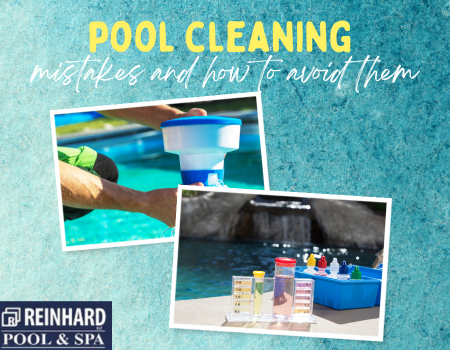While many pool owners handle cleaning and maintenance themselves, common pool cleaning mistakes can lead to various issues, from cloudy water to damaged equipment. Understanding these common pitfalls and knowing how to avoid them can save time, money, and frustration, ensuring your pool remains a pristine and enjoyable space.
Common Pool Cleaning Mistakes and How to Avoid Them
-
 Skipping Regular Cleaning
Skipping Regular Cleaning
- Mistake: One of the most common mistakes is neglecting regular cleaning. Leaves, dirt, and debris can accumulate quickly, leading to unsightly and potentially harmful conditions.
- How to Avoid It: Establish a regular cleaning schedule. Skim the surface of your pool daily to remove floating debris, and vacuum the pool floor weekly. Don’t forget to brush the pool walls and steps to prevent algae buildup.
- Improper Chemical Balance
- Mistake: Incorrectly balancing pool chemicals can cause various issues, from skin irritation to equipment damage. Too much chlorine can be harsh, while too little can lead to bacterial growth.
- How to Avoid It: Test your pool water at least twice a week using a reliable testing kit. Keep the pH level between 7.2 and 7.8, and ensure proper chlorine levels. Familiarize yourself with the necessary adjustments for pH, alkalinity, and chlorine to maintain a healthy balance.
- Overlooking the Pool Filter
- Mistake: Ignoring the pool filter is a significant oversight. A dirty or clogged filter can’t effectively remove contaminants, leading to cloudy or dirty water.
- How to Avoid It: Clean your pool filter regularly according to the manufacturer’s recommendations. This typically involves backwashing sand or DE filters and hosing off cartridge filters. Regular cleaning ensures optimal filtration and extends the life of the filter.
- Not Checking and Emptying Skimmer and Pump Baskets
- Mistake: Skimmer and pump baskets can fill up with debris quickly. If left unchecked, they can impede water flow and strain the pump, leading to potential damage.
- How to Avoid It: Inspect and clear the skimmer and pump baskets weekly. This simple task helps maintain proper water circulation and reduces the workload on your pump and filter.
- Ignoring Water Level
- Mistake: Failing to maintain the correct water level can affect the pool’s skimmer and filtration system. Low water levels can cause the pump to run dry, while high levels can reduce skimmer efficiency.
- How to Avoid It: Keep the water level in the middle of the skimmer opening. Check the water level regularly, especially after heavy rain or during periods of high evaporation, and adjust as needed.
- Not Brushing the Pool Walls and Floor
- Mistake: Skipping the brushing of pool walls and floors can lead to algae and scale buildup. This not only makes the pool unsightly but can also create a slippery and unsafe environment.
- How to Avoid It: Brush the walls, steps, and floor of your pool at least once a week. Use a brush appropriate for your pool’s surface type—nylon bristles for vinyl and fiberglass, stainless steel for concrete.
- Misunderstanding Pool Shock
- Mistake: Many pool owners misunderstand when and how to shock their pool. Infrequent shocking or using the wrong type of shock can leave the pool vulnerable to algae and bacteria.
- How to Avoid It: Shock your pool weekly or after heavy use, heavy rain, or when you notice issues like cloudy water or algae. Follow the manufacturer’s instructions on the shock treatment you choose, and always shock the pool at night to prevent UV degradation of the chemicals.
- Failing to Maintain Pool Equipment
- Mistake: Neglecting regular maintenance of pool equipment like pumps, heaters, and filters can lead to inefficiency and costly repairs.
- How to Avoid It: Regularly inspect and maintain all pool equipment. Lubricate moving parts, check for leaks, and replace worn or damaged components promptly. Arranging for professional inspections annually can help identify issues early.
- Not Addressing Stains Promptly
- Mistake: Ignoring stains on pool surfaces can lead to permanent discoloration and damage. Stains can result from metals, organic material, or improper chemical balance.
- How to Avoid It: Identify and treat stains promptly. Use a pool stain remover suitable for the type of stain. Regularly test and balance your pool water to prevent stains caused by metals or organic material.
- Overuse of Algaecide
- Mistake: Relying too heavily on algaecide can lead to chemical imbalances and reduced effectiveness of other chemicals. Overuse can also cause foaming and other issues.
- How to Avoid It: Use algaecide as a preventive measure rather than a primary solution. Maintain proper chlorine levels and regularly clean your pool to prevent algae growth naturally. Use algaecide according to the manufacturer’s instructions and avoid overuse.
- Inconsistent Pool Cover Usage
- Mistake: Inconsistent use of a pool cover can lead to increased debris, evaporation, and chemical loss. Leaving the pool uncovered can also expose it to UV damage.
- How to Avoid It: Use a pool cover consistently when the pool is not in use. This reduces debris accumulation, conserves water by minimizing evaporation, and helps maintain chemical balance by protecting against UV rays.
- Neglecting Professional Help
- Mistake: Many pool owners try to handle all maintenance themselves, potentially overlooking complex issues that require professional expertise.
- How to Avoid It: Don’t hesitate to seek professional help for complex issues or routine inspections. Professional pool services can provide expert care, identify potential problems early, and ensure your pool is maintained to the highest standards.
Avoiding common mistakes like neglecting regular cleaning, improper chemical balancing, and overlooking equipment maintenance can significantly enhance the longevity and enjoyment of your pool. When you adhere to a consistent maintenance schedule, understand your pool’s needs, and seek professional assistance when necessary, you can ensure your pool remains a safe, clean, and inviting oasis for years to come.
